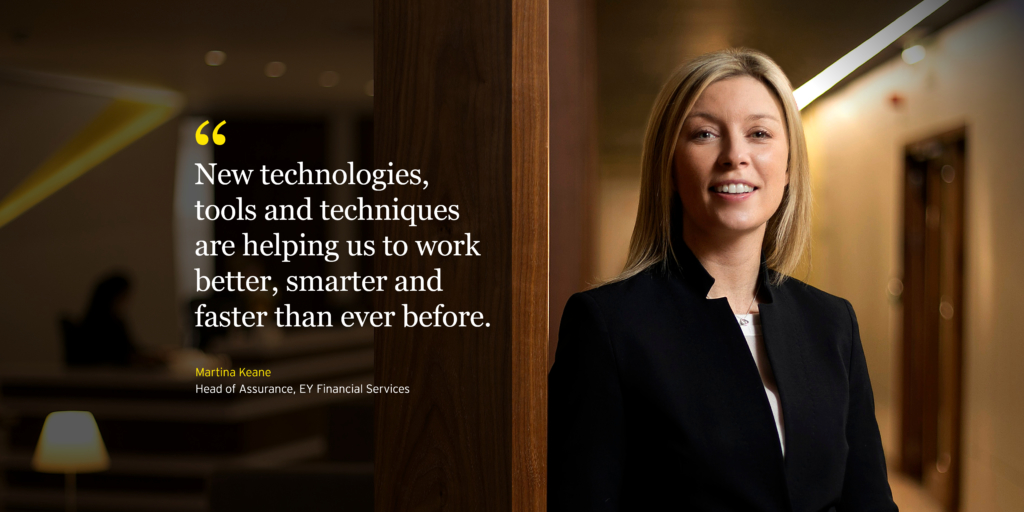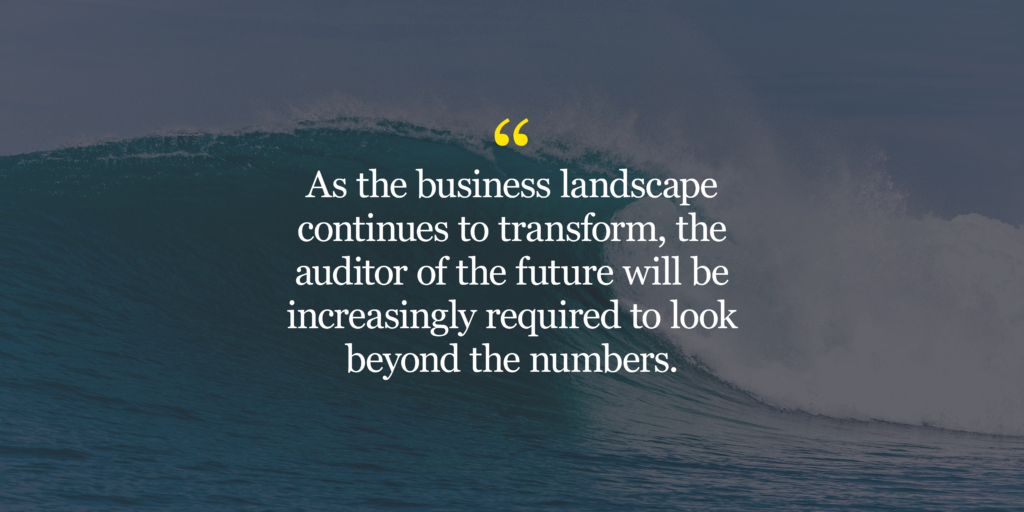For the December issue of Accountancy Ireland, EY’s Martina Keane explains how the next wave of audit innovation is helping auditors work better, smarter and faster than ever before.
New technologies have always changed the way that companies do business, exposing them to new risks and opportunities. Not so long ago, the auditor’s role involved scrutinising stacks of ledgers and communicating by fax or post. Yet today, we are moving towards digital reporting and a paperless profession. When I started my career, the use of robots in the workplace would have seemed like science fiction. Now robotic process automation (RPA) – the use of software robots to simplify business process delivery – is widely used in our clients’ businesses and within the audit process itself. These changes have altered how we work, how we audit and the skills we need to recruit for.
What’s different about the next wave of innovation is the growing sophistication of technology, the proliferation of data and the escalating pace and appetite for change. If futurists such as Ray Kurzweil and Gerd Leonhard are correct, we can expect to witness more change in the next 20 years than in the previous 300. For auditors, new technologies, tools and techniques are helping us to work better, smarter and faster than ever before. Our ability to capture and mine data more effectively allows us to provide more depth of challenge, richer insights and even greater levels of assurance within an increasingly complex world. Data analytics has transformed audits across the financial services industry, allowing audit professionals to analyse larger or even entire datasets. Testing data across a full population presents a more comprehensive story than might otherwise have been achieved through sampling. This in turn leads to greater insights and a deeper understanding of our clients’ businesses, making it easier to identify risks and deliver enhanced quality.

RPA utilises software robots (programs) designed to replicate the actions and behaviour of a human working on a computer in a business environment. RPA is a rule-based system that executes processes without the need for constant human supervision. It can be used to automate some audit procedures that do not include judgement and are data intensive, repetitive in nature, high frequency and rule driven.
The main benefits of RPA are that it reduces the time spent by the audit team on repetitive high-volume, low-risk audit procedures, thereby allowing them to focus on areas that really matter. It also helps to eliminate human error and reduce the administrative burden for both clients and audit teams due to fewer data and evidence requests.
EY has developed a global suite of data analytics tools, which are quickly becoming an integral element in the delivery of audits. Along with general ledger analysers, a suite of industry-specific technology solutions has been developed to support our financial services clients. Within Asset Management, for example, EY’s pioneering global data analytics platform captures data from multiple clients and sources (regardless of the geography of the underlying systems). Once data has been captured, it is then transformed within the platform into a standardised data format. This in turn enables a large-scale automation process that produces an audit-ready suite of work papers and client dashboards. Across our banking and insurance clients, meanwhile, a variety of analysers support the audit of mortgages, consumer loans, corporate loans, investments and claims. In many cases, this has allowed EY to embed predictive analytics within its audits.
The ability to deploy data analytics tools on larger populations of data provides greater confidence in financial reporting, revealing more patterns and trends in clients’ financial data. Analysis of larger or full populations of audit-relevant data presents a fuller picture of the business activities and helps direct our investigative effort in the right areas, while relevant feedback and insights help clients improve their business processes and controls.

EY is beginning to embed emerging technologies such as artificial intelligence (AI) in the audit process. Seen as the next big disruptor, AI tools provide consistent reasoning with high precision, objectivity and accuracy. When applied to the audit, the chances of human error are decreased while quality and value are increased. AI covers a range of technologies including data mining, speech/image recognition and machine learning. These technologies — particularly machine learning — enhance the audit by allowing us to analyse data with advanced pattern recognition, identifying exceptions and anomalies.
Machine learning can be used to assess the internal control framework and data integrity relating to trading activity and related income. It helps us understand transaction statistics, assess data quality in front office systems and perform a critical review of key processes and controls. It can also be used to automatically code accounting entries and detect anomalies in journal entries, analyse a larger number of payment transactions, lending contracts and invoices, which in turn improves fraud detection. Deep learning technology – a form of AI that can analyse unstructured data including emails, social media posts and conference call audio files – is also impacting on the audit. Mining this data provides supplementary audit evidence on a scale that was impossible to gather in the past.
The impact of these new technologies will change much more than the way we audit. To fully harness the power of this next wave of innovation, we must rethink the skills we require from the next generation of auditors. Traditional accounting and auditing skills will not suffice – they must be combined with a deep understanding of AI, predictive analytics, machine learning, smart automation and blockchain. These new audit innovation tools are all about data and, consequently, auditors must be able to interrogate that data, understand what it is telling us and use that information to enhance audit quality. As audit professionals become more proficient in utilising the technological tools at their disposal, they must also develop that ability to interpret the data and tell the data’s story. Furthermore, audit committees must understand how these tools and technologies can be used to enhance transparency, minimise risk and provide unrivalled insights. They need to ask the right questions and have the necessary knowledge to understand the answers.
Soft skills are increasingly important, too. As automation removes labour-intensive, routine tasks like account reconciliation and report generation, audit professionals can instead focus on providing insights into company performance, devoting more time to shaping business strategy and providing added value. By combining a more strategic approach with the traditional values of our profession – integrity, independence and professional scepticism – we can expect the role of audit professionals to evolve to that of a trusted business adviser. Interpersonal and influencing skills will be critical to such a business partner-style approach.
As the business landscape continues to transform, the auditor of the future will be increasingly required to look beyond the numbers and provide a clear and concise narrative for clients, the audit team, audit committees and other stakeholders.
This article first appeared in the December 2019 edition of Accountancy Ireland.